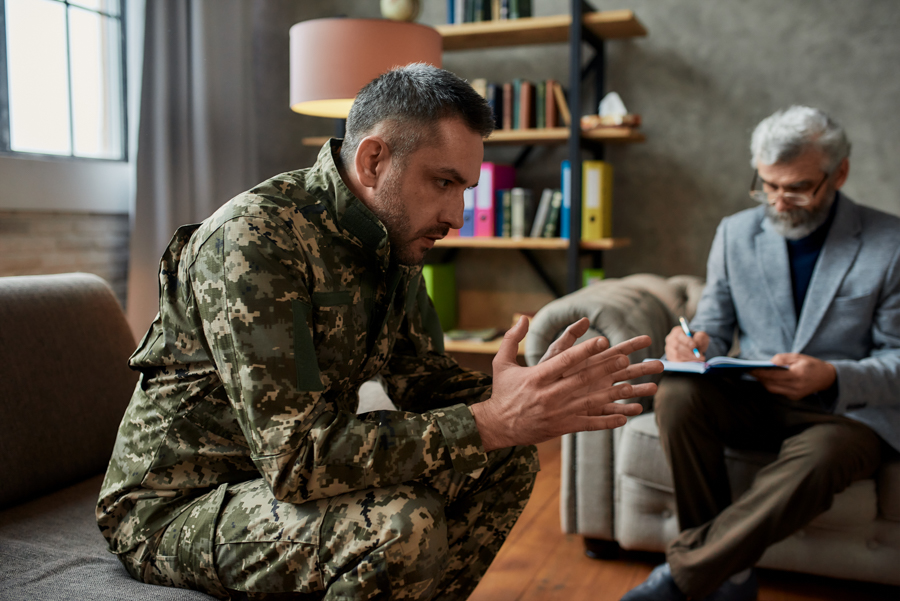Understanding Veteran Culture and the Relevance of PTSD
Even after service, veterans continue to face hardships that affect their mental health and well-being. The scars of war linger long after a veteran has returned home. Many veterans suffer from post-traumatic stress disorder (PTSD) as a result of their service, and it can have a significant impact on their ability to transition back into civilian life.
We will explore the unique culture of veterans and how PTSD can affect them. Learn about the effects of PTSD on veteran’s daily lives, how veterans are supported by one another, and how society can help veterans who are struggling to cope with their experiences.
By increasing our understanding of the effects of PTSD, we can better support our nation’s heroes and help them find healing from their traumatic experiences. Our Indiana treatment facility can help you or a loved one who is interested in mental health treatment in Indiana.
Table of Contents
ToggleWhat is Veteran Culture?
Veteran culture is the unique set of experiences, values, and beliefs shared by those who have served in the military. Veterans take pride in their service to their country and are dedicated to protecting it. They are taught to think independently and to recognize the importance of working together as a team.
Dr. Gregory Burek published an article about veteran culture to provide clinicians with helpful information about how to treat our nation’s heroes. In his writing, Burek gives insight into military culture and the shared experiences of service members. Some of the shared experiences of service members include

- Sacrifice
- Discipline
- Teamwork
- Being part of something greater
- Belonging, loyalty, brotherhood
- Fighting spirit: never giving up
- Suppression and denial
- Dark humor: sarcasm, morbidity
- Concerns about seeking care
- Moral injury
Veterans understand sacrifice and often take responsibility for their actions. As a result, they tend to be resilient when faced with difficult challenges. Veteran culture also includes understanding and recognizing the service of others who have served before them. This deep appreciation for those who have made sacrifices in the past has been ingrained in veteran culture since its inception.
What is PTSD?
Post-traumatic stress disorder (PTSD) is a mental health condition that can affect veterans, as well as civilians, after they experience or witness a traumatic event. Veterans are at higher risk for developing PTSD due to the nature of their military service and the experiences they have been exposed to.
Symptoms of PTSD include
- Nightmares
- Flashbacks
- Difficulty sleeping
- Emotional detachment from people and activities
- Avoidance behaviors
- Irritability
- Trouble concentrating
- Physical pain
The effects of PTSD on veterans can be far-reaching. Many who suffer from this condition find it difficult to hold down jobs or interact with family and friends in meaningful ways. They may also struggle with substance abuse or self-harming behaviors in an attempt to cope with the symptoms. Other effects can include insomnia and poor concentration which can lead to further difficulties in work and relationship settings.
Veterans suffering from PTSD need to seek treatment from qualified mental health professionals such as psychiatrists or psychologists who specialize in the disorder. With appropriate treatment and support systems in place, many veterans can manage their symptoms and lead full lives again.
How Does Veteran Culture and PTSD Relate to Mental Health and Addiction Treatment?
According to Dr. Burek, it is critical to understand veteran culture and post-traumatic stress disorder (PTSD) when treating active duty service members and veterans. The majority of this population began serving at a young age and were introduced to the harsh realities of combat and hardship at the same time their peers were going to college.
Although military combat is a major cause of PTSD, other sources of trauma can lead to the development of this condition. Sexual, verbal, or physical abuse of other service members is just as common on a military base as combat trauma. Additionally, many service members enlist in the military to escape the trauma they experienced in the past.
According to the National Alliance on Mental Illness, 18.5% of veterans reported a mental health condition in 2018. In many cases, veterans turn to substance abuse as a coping mechanism. If you or a loved one who has served in the military requires mental health or substance abuse rehab in Indiana, we can help you.
The Impact of Veteran Culture After Serving
 Veterans face a unique set of challenges when transitioning back into civilian life after serving in the military. Many veterans experience culture shock when they return to the civilian world, as the veteran culture and civilian culture are vastly different.
Veterans face a unique set of challenges when transitioning back into civilian life after serving in the military. Many veterans experience culture shock when they return to the civilian world, as the veteran culture and civilian culture are vastly different.
Veteran culture emphasizes loyalty, structure, and discipline, while civilian culture values individualism and freedom. This can lead to a disconnect between veterans and civilians that can be difficult to bridge. Additionally, veteran culture often encourages veterans to internalize their emotions and hide their feelings from others.
Many veterans struggle with mental health issues upon returning home from service. It is estimated that 20% of Operation Enduring Freedom/Operation Iraqi Freedom/Operation New Dawn Veterans have both PTSD and depression. Additionally, the Substance Abuse and Mental Health Services Administration estimates that 13.5% of Iraq/Afghanistan veterans report symptoms of alcoholism or dependence.
These mental health issues can impact relationships with family members and friends, making it difficult for veterans to connect with those around them. It is essential to understand military culture so we can work together to help our nation’s heroes get the treatment they deserve.
How to Approach Veterans During Treatment
- Ask Questions: Asking questions is a great way to understand the veteran’s experience and specific needs, as well as to better connect with them. Ask open-ended questions and invite the veteran to share their story without pressure or judgment.
- Listen Attentively: Once the veteran has responded, listen carefully and actively, expressing understanding and empathy rather than offering advice or solutions. Focus on engaging in a meaningful conversation about their experiences rather than trying to fix them.
- Foster Trust and Respect: Showing respect for the veteran’s feelings and ideas is essential for building trust, which is key to the successful treatment of veterans. This can be done by having flexible sessions that cater to their unique needs, respecting confidentiality, and ensuring all discussions remain focused on helping the veteran cope with their experiences in a safe environment.
- Show Concern: Demonstrating that you are genuinely concerned about your client’s welfare is an important step in fostering trust between you both. It also allows veterans to feel like they are being heard and understood during treatment, which can be invaluable in helping them heal from any trauma they may have experienced while serving in the military.
- Understand Trauma: Understanding how trauma may have affected veterans physically, psychologically, emotionally, spiritually, and interpersonally is key when treating them with respect and dignity during therapy sessions. It’s important not only to understand what trauma means for each veteran but also how it has impacted their life since leaving service. Treatment professionals can use this information to enroll veterans in a rehab program that best fits their needs.
- Do Not Judge: Healthcare professionals must treat veterans without judgment when discussing issues related to their service or experiences during times of war or crises; this can help foster a sense of security needed when talking about sensitive topics at hand during treatment sessions
- Show Thanks and Appreciation: Acknowledging the bravery of veterans for their selfless service can go a long way in instilling hope while reinforcing appreciation for what they were willing to risk out of dedication to their country or cause. Remembering to thank them provides courage in overcoming obstacles faced later on in recovery!
Treatment For PTSD
Treatment for post-traumatic stress disorder (PTSD) is an ever-evolving field, and several different therapeutic approaches can be used to help individuals cope with their symptoms and gain greater control over their lives.
The most commonly recommended treatments include
- Cognitive Behavioral Therapy (CBT): CBT helps people learn how to identify, question, and replace unhelpful thoughts associated with the traumatic experience.
- Eye Movement Desensitization and Reprocessing (EMDR): EMDR explores how memories of traumatic events may be stored in the brain differently from other memories, working to reprocess those memories into more adaptive versions.
- Trauma Addiction Recovery: Trauma addiction recovery is a form of therapy that treats symptoms of PTSD along with any substance abuse issue a veteran is dealing with. This treatment method helps veterans learn coping mechanisms to deal with both conditions simultaneously.
The right treatment plan for any individual suffering from PTSD will depend on their specific needs and goals. Working closely with an experienced mental health professional can ensure treatment is tailored to that person’s unique situation.
Receive PTSD Treatment at First City Recovery

At First City Recovery, we offer comprehensive PTSD treatment tailored to your specific needs. Our team of qualified professionals is dedicated to helping you manage and overcome the symptoms of your PTSD, such as anxiety, depression, and flashbacks.
We understand how difficult it can be to cope with these symptoms on your own and are here to provide a safe and supportive environment for you to work through them. Through our comprehensive treatment plans, we will help equip you with the tools necessary to lead a healthier life.
Contact us today to learn more about our PTSD treatment services. We can help you overcome the hardship of mental illness and addiction. Find healing at our Indiana treatment facility today!

MD, Psychiatrist
Dr. Vahid Osman, MD is a psychiatry specialist in Indianapolis, IN.
Dr. Osman completed a residency at Austin State Hospital. He has over 32 years of experience in Psychiatry & Behavioral Health. He is board certified by the American Board of Psychiatry and Neurology.




